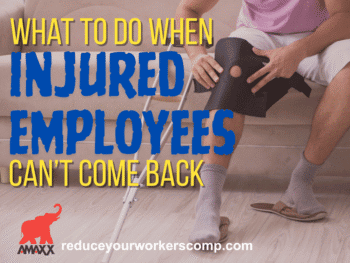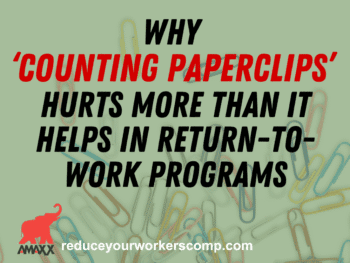When the workers compensation adjusters receive certain types of indemnity claims, they know immediately to set a very large indemnity reserve on the claim. With a death claim, brain damage, second or third degree burns to most of the body, paralysis, and double amputations, reserving is basically adding up how much you will probably pay on the claim.
Where work comp adjusters often have a difficult time getting the reserves correct is on the potential problems claims that are handled at the on-set of the claim as just another routine claim. Some of the types of work comp claims that have the potential to become much larger than originally anticipated include: (WCxKit)
- Employees with a previous history of neck or back injuries.
- Claims involving back surgery (fusion, laminectomy, etc.) on a person who does manual labor.
- Employees who start out with a hostile attitude toward the employer or the insurance company.
- Any claim with a long lag time between the date of the injury and the date the claim is reported to the employer.
- Employee who are not happy with the medical treatment being received and switch doctors more than once (in claims lingo known as “doctor shopping” as the employee looks for a doctor who will not question the employee’s subjective complaints).
- Switching doctors, after obtaining an attorney, to a doctor known in the local insurance industry and medical community to be “pro-surgery” or “pro-claimant.”
- Any claim where the employee gets hooked on narcotics.
- The employee is near retirement age.
- The employer has announced an impending work-force reduction, or the employee has just been laid-off from work (work comp indemnity checks are usually much higher than unemployment checks).
10.The employee applies for social security disability (sometimes even before the adjuster has received the medical reports from the treating physician).
11.The workers compensation check is greater per week than the employee’s prior take home pay (when take home pay is reduced by union dues, 401K contributions, state income taxes, etc).
It is the adjuster’s responsibility to recognize and deal with these issues when they become known to the adjuster. If the adjuster does not respond to these type of issues when they arise, the claims will deteriorate {cost a whole lot more than they should}. The risk manager for the employer should act when the inexperienced adjuster does not recognize the impending problem or the lazy adjuster does not act on the impending problem. Any time either the adjuster, the adjuster’s supervisor or the risk manager see a potential problem developing they should take action immediately. It is a whole lot easier to stop a new problem claim from developing into a bad claim than it is stop a bad claim that is well established.
Many of these issues can be prevented, or stopped when they start, by taking strong action as soon as they are recognized. An in-depth initial investigation will stop most employees from building an otherwise legitimate injury claim into a monster claim, or a fraudulent attempt into a successful fraud. With claims that are reported late, or the employee has a hostile attitude, or the employee’s job is ending either due to retirement or a reduction in workforce, the appropriate investigation will stop these types of claims from mushrooming into major claims. If the employee sees a detailed investigation going on, they are much less likely to pursue building their claim up when they know they are being watched. On the other hand, if the employee never hears from the adjuster, or the adjuster only makes a perfunctory initial contact with the employee, the employee is emboldened by the lack of investigation.
After a strong initial investigation by the adjuster, the next best thing to stop many of these claims is a well-established, enforced early return to work program with modified duty available and provided to the employee. If the employee is back to work, it is difficult for them to convince even a “pro-claimant” doctor that they should be on social security disability. It is also difficult for the employee to go “doctor shopping” when they are working and being back at work does not give the employee the opportunity to net more pay out of work comp than they do on the job.
If the in-depth investigation and the early return to work program have not obtained control of the claim, in depth medical case management can prevent some claims from getting out of control. When a nurse case manager is working with the employee who has had previous back or neck problems, often they can work with the medical provider to obtain conservative treatment that returns the employee to their pre-injury physical status without surgery. Also, it is easier to keep employee from becoming narcotic addicted if they have not had surgery, or if they had surgery, their narcotic usage is monitored. (WCxKit)
If the employer, adjuster and nurse case manager work together as a team, most of the routine work comp claims that become large dollar claims can be prevented. Strong claim handling by the adjuster, an involved employer, and a dedicated nurse case manager can exercise the claim guidance needed to keep the routine claims with potential problems from becoming the large dollar claims.
Author Rebecca Shafer, JD, President of Amaxx Risks Solutions, Inc. is a national expert in the field of workers compensation. She is a writer, speaker and website publisher. Her expertise is working with employers to reduce workers compensation costs, and her clients include airlines, healthcare, printing/publishing, pharmaceuticals, retail, hospitality and manufacturing. See www.LowerWC.com for more information. Contact: RShafer@ReduceYourWorkersComp.com or 860-553-6604.
WC IQ TEST: http://www.workerscompkit.com/intro/
WORK COMP CALCULATOR: http://www.LowerWC.com/calculator.php
MODIFIED DUTY CALCULATOR: http://www.LowerWC.com/transitional-duty-cost-calculator.php
WC GROUP: http://www.linkedin.com/groups?homeNewMember=&gid=1922050/
SUBSCRIBE: Workers Comp Resource Center Newsletter
Do not use this information without independent verification. All state laws vary. You should consult with your insurance broker or agent about workers comp issues.
©2011 Amaxx Risk Solutions, Inc. All rights reserved under International Copyright Law. If you would like permission to reprint this material, contact Info@ReduceYourWorkersComp.com.



























